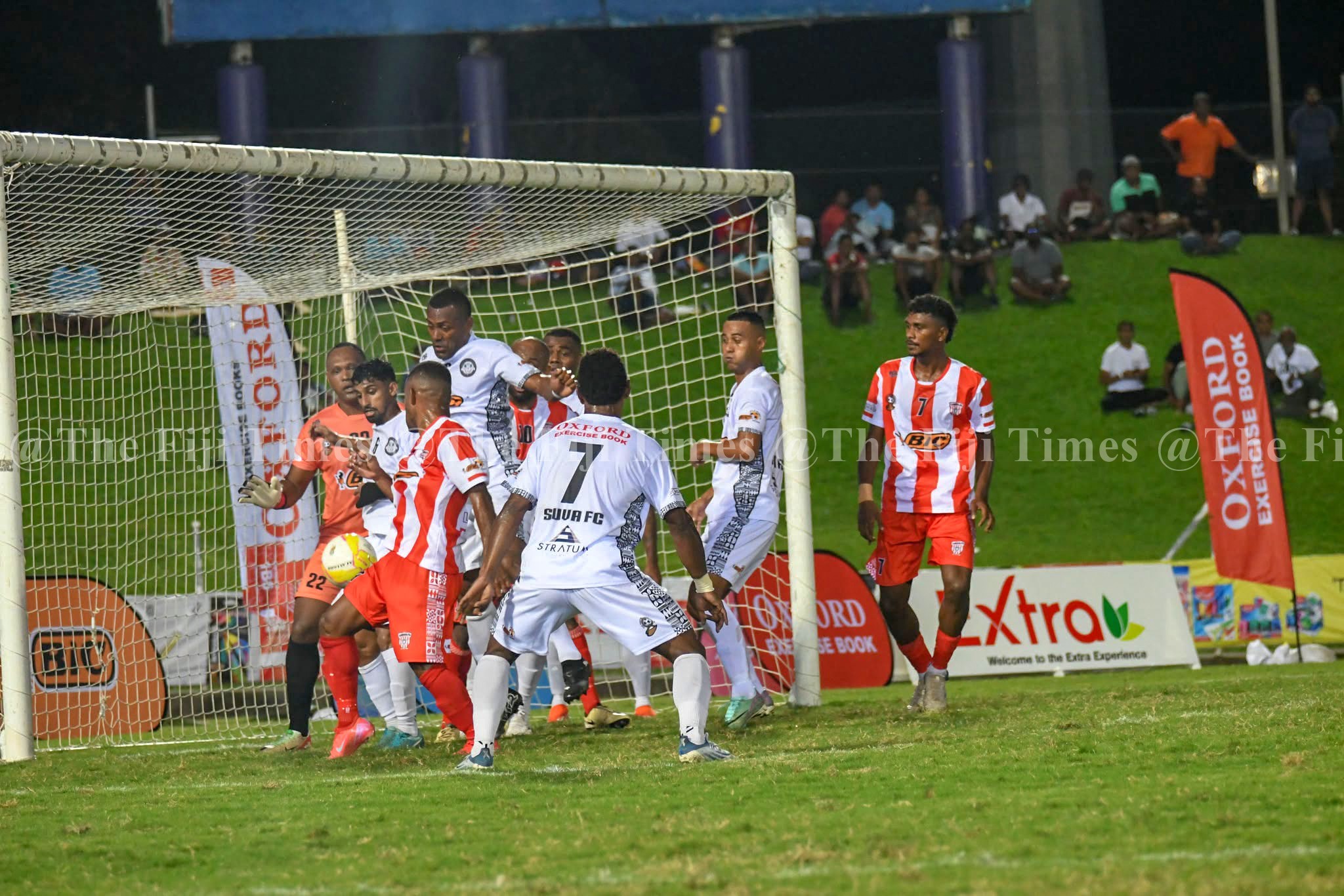The HFC Bank Stadium in Suva yesterday was alive with an electric energy, a pulsating atmosphere of anticipation, passion, and pride. The 2025 BiC Fiji FACT began with a symphony of drums, chants, and cheers, echoing through the stands as fans from across the nation gathered to celebrate their clubs, their communities, and the beautiful game of football.
From the moment the gates opened, waves of supporters clad in team colours—reds, blues, blacks, and maroons—flooded the stadium. They came bearing flags, banners, painted faces, and drums, ready to ignite the grandstands with song and dance. The first day of the tournament was more than just matches on a pitch; it was a living tapestry of emotions, where every goal, pass, and near miss sent ripples through the thousands watching from the stands, embankments, and television screens.
As the midday sun blazed down on Suva, the opening match of the tournament set the stage. Nadi vs Nadroga, Group B’s first encounter, kicked off under the relentless Suva heat. It was a clash of titans, with both teams desperate to gain early momentum in the competition. Yet, as the minutes ticked by and the sun scorched the pitch, the scoreboard remained stubbornly blank. Nil-all, a result that spoke of missed opportunities and stubborn defence, but also of two sides unwilling to yield an inch in their first test of the tournament.
Supporters from both camps stood tall, their drums and chants rising in intensity as the match neared its conclusion. Each near miss, each diving save, was met with gasps of disbelief or sighs of relief.
Though no goals were scored, the emotions were raw and real—disappointment for the strikers, pride for the goalkeepers, and a mutual respect from both sets of fans for a hard-fought contest.
As the sun dipped lower, the grandstands began to fill, and the shadows lengthened across the field. The second match brought together Navua and Lautoka, a Group A showdown that would not disappoint. With familiar faces on both sides, the tension was palpable.
The transfer of Sairusi Nalaubu from Lautoka to Navua earlier this year had added a layer of intrigue. When he stepped onto the pitch wearing red instead of blue, the crowd buzzed with anticipation.
The match was a rollercoaster of emotions.
Navua played with flair and resilience, their passes crisp and attacks relentless. Yet it was Lautoka’s Saula Waqa who broke the deadlock in the 57th minute with a stunning goal that sent the Lautoka fans into a frenzied celebration.
Flags waved, drums pounded, and chants of “Blues! Blues!” reverberated through the air as Waqa’s teammates swarmed him in jubilation.
But football is never over until the final whistle. As the minutes dwindled and Navua’s hopes of a comeback flickered, Sairusi Nalaubu seized his moment.
In injury time, with the crowd holding its collective breath, he slotted the ball into the net, sending Navua’s supporters into rapturous celebration. His goal was more than just an equaliser; it was a statement of redemption, loyalty, and resilience.
The final whistle blew at 1-1, leaving both teams with something to fight for in their next matches and fans with memories to cherish.
By the time the third match began, the atmosphere was electric. The grandstands were a kaleidoscope of colours as supporters of Rewa and Ba created a spectacle of noise and passion. The roar of the crowd as Rewa took to the field, clad in their maroon and red, was deafening. The men in black from Ba, fierce and determined, responded with their own wave of cheers and chants.
This was more than just football—it was a battle of pride, legacy, and community spirit. The tension was thick, but it was Rewa’s Setareki Hughes who brought the crowd to its feet in the 24th minute with a clinical finish that rippled the net.
The eruption of cheers was so loud it could be felt in the stands and heard beyond the stadium walls. Hughes’ goal ignited Rewa’s confidence and gave them the edge they needed to hold on for a hard-fought 1-0 victory.
As the sun finally dipped below the horizon and the stadium lights flickered on, the cooler evening air brought renewed energy.
Fans awaited the final match of the day between Suva and Labasa, scheduled for 7pm.
The excitement was palpable, the anticipation building as fans of both sides filled every available space, waving flags and singing team songs.
But the closing minutes of the Ba-Rewa match, which extended to the 86th minute even as the official opening was scheduled for 6.30pm, delayed the kick-off.
It was a reminder that football, like life, doesn’t always run on schedule.
Yet for the fans, the wait was worth it.
The prospect of watching Suva and Labasa clash under the Suva lights was enough to keep them standing, cheering, and chanting into the night.
Throughout the day, the air was thick with emotions—hope, frustration, joy, heartbreak, and anticipation.
Children sat on parents’ shoulders waving flags, elders tapped their feet in time with the drums, and players from every match shared moments of triumph and regret.
Vendors sold snacks and drinks, adding to the festival-like atmosphere, while the smell of food mingled with the scent of fresh-cut grass.
The day wasn’t just about football; it was about the communities that gathered to support their teams. It was about friends reuniting, families bonding, and strangers becoming comrades through shared loyalties. It was a celebration of Fijian football culture, a testament to the power of sport to bring people together.
As the stadium lights shone brighter against the night sky and the final match prepared to kick off, the fans remained a vibrant, noisy force, a living testament to their unwavering support.
Win, lose, or draw, they were there to cheer on their teams, to witness moments of brilliance and heartbreak, and to revel in the shared love of the game.



